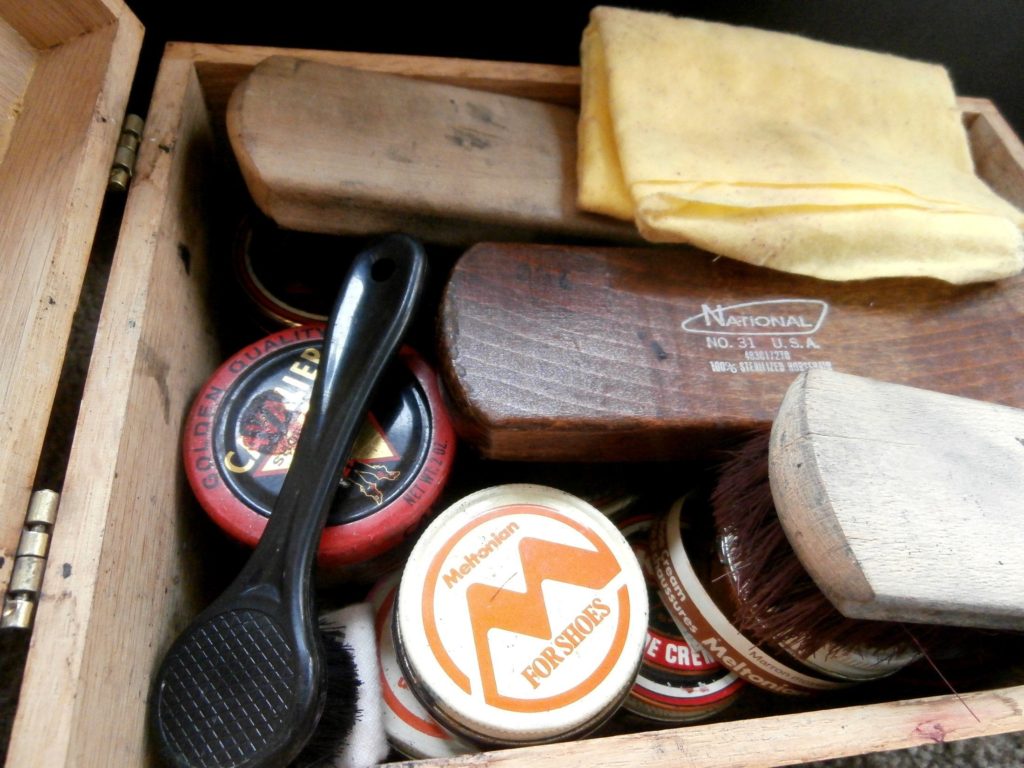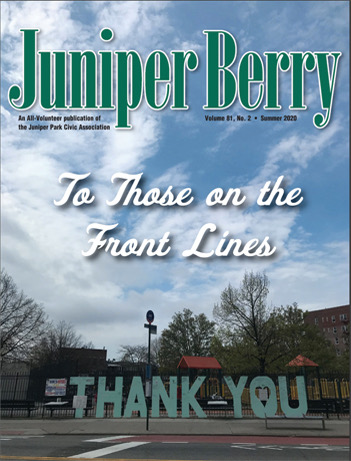I was only thirteen years old when separated from my family. My mother was hospitalized for several months, I don’t know why. Never told. As a result, I was forced to stay with my aunt Marie and uncle Jerry. They lived in an apartment on North 5th Street in the Williamsburg section of Brooklyn, NYC. They just had a beautiful baby girl, Paula. Back then, Williamsburg was a rundown immigrant community of Italians, Irish, and working-class white Americans, Polish, Catholics, and Jews all seemed to live in harmony.
At my uncle’s home, I learned to shine shoes by watching him shine his shoes every time they were scuffed. Uncle Jerry was a New York City Policeman who I once respected. He owned an old fashion pine wooden shoeshine box. It had a pedestal imprint of a raised footprint in which one could rest one’s shoe on top. My uncle made shoe-shining fun, snapping a rag to leather to obtain a glass finish.
I wanted a box just like uncle Jerry’s, so I could make money. I needed to help my mother out financially, since we were destitute, without a father to help support us. Mama was the only breadwinner in the household. We lived in a basement in Corona, Queens, NYC. Below the level of the street. Every time there was a heavy rainfall, our apartment flooded. We did not own a telephone, television, washing machine, or dryer. Mama washed clothes in the kitchen sink with a washboard and Octagon soap. Oh, I remember! We had an icebox, and coal heated our apartment. I remember a coal truck backing up to a window, fuel came down a chute, and fill the boiler room.
I remember going to the ice plant with my little red four-wheel wagon to buy dry ice at the ice plant located between 108th and 111th Streets on 47th Avenue in Corona, Queens. Yes, times were hard, but I saw a way out if only my uncle could lend me his shoeshine box for a couple of weeks. I asked him, but he refused. I felt sad and disappointed, he declined. Mama came home from the hospital. Our family was united. I remember how sad I felt that mama was always working, cleaning, cooking, washing clothes, and sewing to make a living as a piece-maker worker. The sewing machine was a Singer cast iron model. It was continually running, day and night.
Still, we never seemed to have enough money. I remember mama going to the local butcher shops to get free fat, lard to make soap or soup or cook and make cosmetics, and some bones to make soup. Hopefully, the bones had a little meat on them. Sometimes the whole family would go to Flushing Meadow Corona Park. The former site of the 1939-41 and 1964-65 World’s Fair, once affectionately known as the Corona dumps, to salvage for radishes, asparagus, wild garlic, dandelions, and whatever else mama could put together to make us eat. I remember mama always giving her children the meat first, often going without it for herself. As a thirteen-year-old boy, I was ashamed that I was unable to help mama. I didn’t know-how.
One day, as I was coming home from school, Public School 14, I passed a thrift shop located on Corona Avenue between 51st and 52nd Streets. In the window was a shoeshine box. Just what I needed. I went inside to inquire what the price was. I could not afford to buy the shoeshine box at twenty dollars. I didn’t have any money. I informed Mr. Schwartz, the owner of the thrift shop, why I needed the shoeshine box. I told him my story about how I wanted to help my mother, but I had no money. I asked if I could borrow the shoeshine box so I could make some money. He said, “Are you kidding? Get out of here.” As I was leaving, he said, “Didn’t I see you passing my store every day?” “Yes,” I replied, “I go to Public School 14.” As I started to walk out of the store, he called me back. He asked me, “What happened to your father? How is your mother doing now? If I loan you the shoeshine box, will I ever see you again?”
“Oh, yes, sir! As soon as I make enough money, I will pay you back.” He pulled the box out of the window. Off I went box in hand.
In Corona 1960, it seemed that every corner along 108th Street from 41st Avenue all the way to Roosevelt Avenue had either a bar or restaurant or both. There was a club called the Red Wing Club. Located between 44th and 43rd Avenues on 108th street, Corona, Queens. It was here that the local baseball team would hang out. I would shine a pair of shoes here. Every day, after school, I would go shoe shining. In time I became quite good. I developed a clientele. I even acquire house calls polishing shoes door-to-door. On the corner of Roosevelt Avenue and 108th Street and Corona Plaza was Mrs. Diamond’s candy store. Mrs. Diamond was an Eastern European immigrant who hired me to go to her home every week to shine the shoes of her three sons and her husband. She was kind, caring, and humane.
All these years later, I have not forgotten her. She is probably no longer with us. Two weeks later, I went back to Mr. Schwartz’s thrift shop to pay him in full. He said, “You already paid me.’ “No,” I said, “I didn’t.” “Yes, you did. You kept your word. The box is my gift to you and your mother.” Every time I passed the thrift shop, I stopped in to give Mr. Schwartz a shine. We became friends. He would talk to me about my school, mama, and my brothers. I learned then the value of kindness, which my mama had always instilled in her children.
That Thanksgiving, we were able to celebrate because I made over $45 that week shoe shining. We did not have to eat radish soup. Mama was so proud of me. She used to call me her little man, but she did not want me to shoeshine. She said, “You have to concentrate on your education.” But times being what they were, it was not always possible. When you are hungry, shoe shining could make all the difference. I continued shoe-shining after school and during the holidays and vacation time for over two years.
I remember being mugged by a group of thugs. They stole my day’s earning and ran off with my shoeshine box. Two truck drivers, The Dolan brothers witnessed the assault, got out of their trucks, and ran after them. One of the kids smashed my box to the ground and kept running. They broke my shoeshine box, but the truck driver said he would fix it. He did, and added a drawer, too. It was now much sturdier. The two men told me how proud they were of me and wished their children would grow up like me. They drove me home. My mother was very thankful but upset with me. She did not want me to shoeshine anymore.
My shoeshine days were almost coming to an end. After several weeks as things calmed down, I would sneak out the basement back door and go shoe shining. One day, I was shining shoes at the Red Wing Club when my uncle walked in. He was embarrassed and tried to avoid me. He cornered me and demanded I leave at once. He tried to bribe me by giving me $10 to go home. I was quite upset. After all, this was my most profitable location. He escorted me out the front door. So, I merely entered the back door and resumed my shoe shining. I was almost finished when my uncle saw me. He started to yell at me and slapped me in the face. Many of the men in the bar protested and stood up for me. My uncle was humiliated. That night, he came to my home and against my mother’s wishes, took the shoeshine box out of the closet, and walked out. My mother never spoke to her brother again, having stood up to defend me.
Years later, I bought another shoeshine box. I was now studying hard in high school and into other things. Not long after my purchase of a shoeshine box, there was a young boy in my neighborhood who reminded me of when I was his age. His name was Jose. So, I gave him my shoeshine box and told him how it helped me to become a man. That year we moved from the neighborhood, and it would be decades before I returned. I don’t know what happened to Jose, the young boy I gave my shoeshine box to.
Schwartz’s thrift shop is now gone. So is the ice plant and all the bars along 108th Street where I shoe shined. I often wonder what happened to Mr. Schwartz, Mrs. Diamond, The Dolan brothers. They were all so kind to me many years ago. Decades passed. Shopping at Macy’s Department store in Manhattan, I saw a fancy shoeshine box in the window. I asked the sales lady who was somewhat nasty about me inquiring about the shoeshine box in the window. She told me it was a display item and not for sale. I asked to see the manager.
She was reluctant to call her manager, but I was insisting. I told the manager I wanted to purchase the shoeshine box in the window. He said flippantly, “Come back in a year.” One year later, I went back. Bought that beautiful shoeshine box in the window from the same nasty sales lady. “Strange,” she remarked. “I remember you,” and said she didn’t think I was serious. I replied, “You don’t know my story.”
I had an oval brass plate engraved with my name and had it attached to my box. It reads, “Tomeo’s Box.” It is something that speaks to me about a rewarding life’s journey. It is displayed in the corner of my living room as a reminder of a fulfilling life.
Shoeshine Boy 1960
Like shadows of dancing clouds, succumbing to the sun,
a rag can expose a shine,
On his knees,
Slap, slap, slap,
Snap, snap, snap,
Buff, buff, buff,
See a face in a leather mirror glitter bright.
Strange,
A box can make a man out of a boy.



